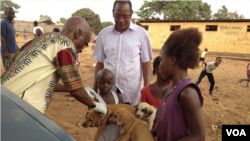The Ebola crisis in Sierra Leone has sparked worries about another disease: rabies. Many dog owners fear their pets could infect them with the Ebola virus and have abandoned them, leading to an increase in the country's stray dog population.
Rabies is endemic in Sierra Leone, which has one of the largest stray dog populations in Africa. The situation has become worse during the Ebola crisis.
Dr. Gudosh Jalloh is one of only a few veterinarians in the country. His organization the Sierra Leone Animal Welfare Society and other local partners have launched a campaign to create more awareness on caring for dogs in the time of Ebola.
Jalloh estimates there are about 500,000 stray dogs in Sierra Leone, double the number before Ebola. He says part of the reason for the increase is when owners die from the disease, no one else wants the dog because they fear it will transmit the virus.
“So people started to stigmatize their dog, abandon them, not looking after them, we had some communities where people were really being cruel to the animal, to the dogs,” he said.
But according to the U.S. Centers for Disease Control, dogs can carry the virus but cannot transmit it.
Jalloh has been traveling around the country informing communities that dogs cannot transmit Ebola.
He also says there is concern about rabies increasing with this overpopulation. For years he has been trying to keep rabies down by giving free vaccinations and sterilizing dogs. He relies mainly on international funding, but he says it is always an uphill battle financially.
During this Ebola crisis, the rabies vaccine was not available in the country for several months because airlines canceled flights to Sierra Leone. Only within the past few weeks has he received a rabies vaccine.
“What we really need to do now is to do humane dog population control, which will include vaccination, sterilization and, when necessary, humane culling," Jalloh said.
Mabinty Kamara works with the Freetown City Council -- a partner in the campaign -- and says another goal is to reduce animal abuse by making sure communities realize the importance of dogs.
“These animals are very useful to us, at night we have thieves coming around and dogs will bark at them, so they will be scared," Kamara said. "So it is very important for us to take care of these animals.”
Kamara says reaction from the communities has been good and most are complying with the campaign's advice.
Veterinarian Emmanuel Wilson, who works in the campaign with the Ministry of Agriculture, says education is key.
“Some of them like to take pets when they are very young, as time goes on, so they lose interest and leave them out in street to roam about. But if they have education, to take care of their animals, we will not see any dogs in the street,” he said.
Jalloh says he will continue to do this kind of work, because of his strong passion for animals.




